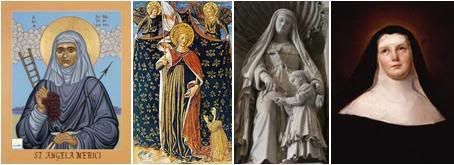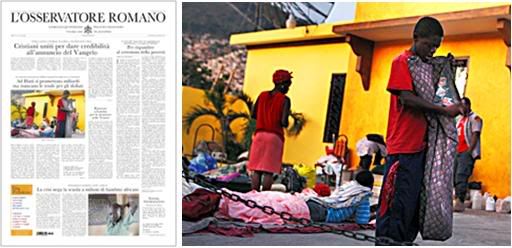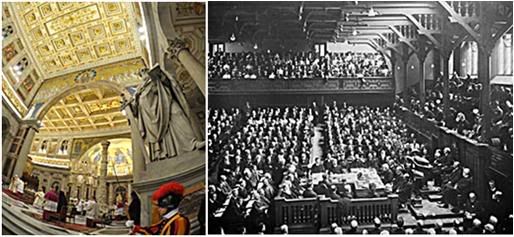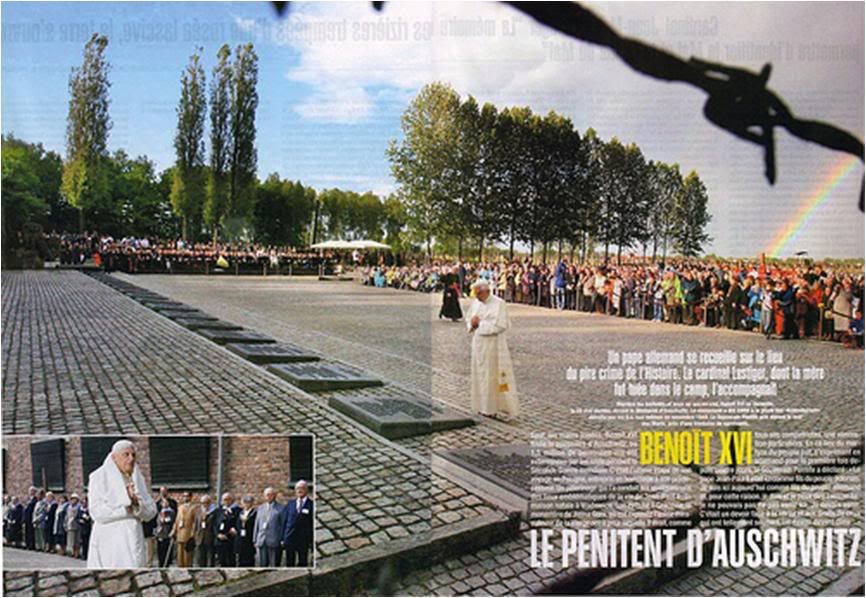| | | OFFLINE | | Post: 19.354
Post: 1.996 | Registrato il: 28/08/2005
Registrato il: 20/01/2009 | Administratore | Utente Veteran | |
|
 Wednesday, January 27
Wednesday, January 27
 Middle photos: Painting by Bozzoli, and statue in St. Peter's Basilica.
ST. ANGELA MERICI (Italy, 1470-1740)
Middle photos: Painting by Bozzoli, and statue in St. Peter's Basilica.
ST. ANGELA MERICI (Italy, 1470-1740)
Third-Order Franciscan, Founder, Company of St. Ursula
Born in Desenzano by Lake Garda, Angela spent most of her life in nearby Brescia. Early on,
she became interested in educating poor children and joined the Third Order of St. Francis
for laywomen. In 1524, she was on her way to visit the Holy Land and was said to have gone
suddenly blind in Cyprus. She proceeded with the pilgrimage anyway, and on her way back to
Italy, is said to have regained her sight in the same place in Cyprus where she went blind.
At the age of 62, she founded the Company of St. Ursula, named after the patron saint of
medieval universities, dedicated to 're-Christianising family life' through educating girls to be
Christian wives and mothers. The Ursulines were the first teaching congregation of sisters, but
they remained 'secular' - not living in communities - for 17 years before seeking recognition
as an order. Their sisters have since then had the choice to be 'religious' or enclosed nuns, or
'congregated' who follow the original plan. Ursulines were the first missionary nuns to Canada
and what is now the United States. Today, Ursuline educational institutions are found worldwide.
Mother Angela was canonized in 1807.
Readings for today's Mass: www.usccb.org/nab/readings/012710.shtml
OR today.
 Page 1 photo above, Gauguin-like photo of homeless couple in Port au Prince. Below left, Vespers at St. Paul's on Monday,
Page 1 photo above, Gauguin-like photo of homeless couple in Port au Prince. Below left, Vespers at St. Paul's on Monday,
and right, 1910 Edinburgh Conference which started the modern ecumenical movement.

Pope concludes the Week of Prayer for Christian Unity
'United, Christians give credibility to Gospel announcement'
Other Page 1 stories: The role of the Holy See in promoting Millennium Development Goals
(MDG); international community sets first-decade reconstruction goals for Haiti but
immediate need is for tents to house some 2 million homeless; how millions of African
children are missing out on education due to ongoing wars.
THE POPE'S DAY
General Audience today - The Holy Father dedicated his catechesis to St. Francis of Assisi
as a 'giant of sanctity' in his teaching cycle on the great Christian figures of the Middle Ages.
He also paid homage to the victims of Nazism on this World Day to commemorate the Holocaust.
After all the recurrent and repeated accusations in the past five years against Benedict XVI by fault finders who behave as though Joseph Ratzinger should take upon himself the full weight of guilt for the Holocaust because he is German and still alive (therefore, a more immediate scapegoat than Pius XII) - how infinitely moving it is to read once more the address he delivered in Auschwitz-Birkenau in 2006! His pilgrimage to Auschwitz, I think, is the most memorable and emotion-laden event so far of his Pontificate.
The occasion was unique and unrepeatable. No other German who lived in the Nazi years has been and will be Pope. No rainbow was perhaps more significant since the rainbow that came to Noah as a sign that the Great Deluge was a thing of the past. One had hoped it would be a sign of an end to recriminations over the Holocaust, but it was not to be. .
LOOKING BACK:
BENEDICT XVI IN AUSCHWITZ-BIRKENAU, 5/28/06
 The Holy Father delivered this address in Italian after saying a prayer in German.
The Holy Father delivered this address in Italian after saying a prayer in German.
To speak in this place of horror, in this place where unprecedented mass crimes were committed against God and man, is almost impossible - and it is particularly difficult and troubling for a Christian, for a Pope from Germany.
In a place like this, words fail; in the end, there can only be a dread silence - a silence which is itself a heartfelt cry to God: Why, Lord, did you remain silent? How could you tolerate all this?
In silence, then, we bow our heads before the endless line of those who suffered and were put to death here; yet our silence becomes in turn a plea for forgiveness and reconciliation, a plea to the living God never to let this happen again.
Twenty-seven years ago, on 7 June 1979, Pope John Paul II stood in this place. He said: “I come here today as a pilgrim. As you know, I have been here many times. So many times! And many times I have gone down to Maximilian Kolbe’s death cell, paused before the execution wall, and walked amid the ruins of the Birkenau ovens. It was impossible for me not to come here as Pope.”
Pope John Paul came here as a son of that people which, along with the Jewish people, suffered most in this place and, in general, throughout the war. “Six million Poles lost their lives during the Second World War: a fifth of the nation”, he reminded us.
Here too he solemnly called for respect for human rights and the rights of nations, as his predecessors John XXIII and Paul VI had done before him, and added: “The one who speaks these words is ... the son of a nation which in its history has suffered greatly from others. He says this, not to accuse, but to remember. He speaks in the name of all those nations whose rights are being violated and disregarded ...”.
Pope John Paul II came here as a son of the Polish people. I come here today as a son of the German people. For this very reason, I can and must echo his words:
I could not fail to come here. I had to come. It is a duty before the truth and the just due of all who suffered here, a duty before God, for me to come here as the successor of Pope John Paul II and as a son of the German people - a son of that people over which a ring of criminals rose to power by false promises of future greatness and the recovery of the nation’s honour, prominence and prosperity, but also through terror and intimidation, with the result that our people was used and abused as an instrument of their thirst for destruction and power.
Yes, I could not fail to come here. On 7 June 1979 I came as the Archbishop of Munich-Freising, along with many other Bishops who accompanied the Pope, listened to his words and joined in his prayer.
In 1980 I came back to this dreadful place with a delegation of German Bishops, appalled by its evil, yet grateful for the fact that above its dark clouds the star of reconciliation had emerged.
This is the same reason why I have come here today: to implore the grace of reconciliation - first of all from God, who alone can open and purify our hearts, from the men and women who suffered here, and finally the grace of reconciliation for all those who, at this hour of our history, are suffering in new ways from the power of hatred and the violence which hatred spawns.
How many questions arise in this place! Constantly the question comes up: Where was God in those days? Why was he silent? How could he permit this endless slaughter, this triumph of evil?
The words of Psalm 44 come to mind, Israel’s lament for its woes: “You have broken us in the haunt of jackals, and covered us with deep darkness ... because of you we are being killed all day long, and accounted as sheep for the slaughter. Rouse yourself! Why do you sleep, O Lord? Awake, do not cast us off forever! Why do you hide your face? Why do you forget our affliction and oppression? For we sink down to the dust; our bodies cling to the ground. Rise up, come to our help! Redeem us for the sake of your steadfast love!” (Ps 44:19, 22-26).
This cry of anguish, which Israel raised to God in its suffering, at moments of deep distress, is also the cry for help raised by all those who in every age - yesterday, today and tomorrow - suffer for the love of God, for the love of truth and goodness. How many they are, even in our own day!
We cannot peer into God’s mysterious plan - we see only piecemeal, and we would be wrong to set ourselves up as judges of God and history. Then we would not be defending man, but only contributing to his downfall.
No - when all is said and done, we must continue to cry out humbly yet insistently to God: Rouse yourself! Do not forget mankind, your creature!
And our cry to God must also be a cry that pierces our very heart, a cry that awakens within us God’s hidden presence - so that his power, the power he has planted in our hearts, will not be buried or choked within us by the mire of selfishness, pusillanimity, indifference or opportunism.
Let us cry out to God, with all our hearts, at the present hour, when new misfortunes befall us, when all the forces of darkness seem to issue anew from human hearts: whether it is the abuse of God’s name as a means of justifying senseless violence against innocent persons, or the cynicism which refuses to acknowledge God and ridicules faith in him.
Let us cry out to God, that he may draw men and women to conversion and help them to see that violence does not bring peace, but only generates more violence - a morass of devastation in which everyone is ultimately the loser.
The God in whom we believe is a God of reason - a reason, to be sure, which is not a kind of cold mathematics of the universe, but is one with love and with goodness.
We make our prayer to God and we appeal to humanity, that this reason, the logic of love and the recognition of the power of reconciliation and peace, may prevail over the threats arising from irrationalism or from a spurious and godless reason.
The place where we are standing is a place of memory. The past is never simply the past. It always has something to say to us; it tells us the paths to take and the paths not to take.
Like John Paul II, I have walked alongside the inscriptions in various languages erected in memory of those who died here: inscriptions in Belarusian, Czech, German, French, Greek, Hebrew, Croatian, Italian, Yiddish, Hungarian, Dutch, Norwegian, Polish, Russian, Romani, Romanian, Slovak, Serbian, Ukrainian, Judaeo-Spanish and English.
All these inscriptions speak of human grief, they give us a glimpse of the cynicism of that regime which treated men and women as material objects, and failed to see them as persons embodying the image of God.
Some inscriptions are pointed reminders. There is one in Hebrew. The rulers of the Third Reich wanted to crush the entire Jewish people, to cancel it from the register of the peoples of the earth.
Thus the words of the Psalm: “We are being killed, accounted as sheep for the slaughter” were fulfilled in a terrifying way. Deep down, those vicious criminals, by wiping out this people, wanted to kill the God who called Abraham, who spoke on Sinai and laid down principles to serve as a guide for mankind, principles that are eternally valid.
If this people, by its very existence, was a witness to the God who spoke to humanity and took us to himself, then that God finally had to die and power had to belong to man alone - to those men, who thought that by force they had made themselves masters of the world.
By destroying Israel, they ultimately wanted to tear up the taproot of the Christian faith and to replace it with a faith of their own invention: faith in the rule of man, the rule of the powerful.
Then there is the inscription in Polish. First and foremost they wanted to eliminate the cultural elite, thus erasing the Polish people as an autonomous historical subject and reducing it, to the extent that it continued to exist, to slavery.
Another inscription offering a pointed reminder is the one written in the language of the Sinti and Roma people. Here too, the plan was to wipe out a whole people which lives by migrating among other peoples. They were seen as part of the refuse of world history, in an ideology which valued only the empirically useful; everything else, according to this view, was to be written off as lebensunwertes Leben - life unworthy of being lived.
There is also the inscription in Russian, which commemorates the tremendous loss of life endured by the Russian soldiers who combated the Nazi reign of terror; but this inscription also reminds us that their mission had a tragic twofold aim: by setting people free from one dictatorship, they were to submit them to another, that of Stalin and the Communist system.
The other inscriptions, written in Europe’s many languages, also speak to us of the sufferings of men and women from the whole continent.
They would stir our hearts profoundly if we remembered the victims not merely in general, but rather saw the faces of the individual persons who ended up here in this abyss of terror.
I felt a deep urge to pause in a particular way before the inscription in German. It evokes the face of Edith Stein, Theresia Benedicta a Cruce: a woman, Jewish and German, who disappeared along with her sister into the black night of the Nazi-German concentration camp; as a Christian and a Jew, she accepted death with her people and for them.
The Germans who had been brought to Auschwitz-Birkenau and met their death here were considered as Abschaum der Nation - the refuse of the nation. Today we gratefully hail them as witnesses to the truth and goodness which even among our people were not eclipsed. We are grateful to them, because they did not submit to the power of evil, and now they stand before us like lights shining in a dark night.
With profound respect and gratitude, then, let us bow our heads before all those who, like the three young men in Babylon facing death in the fiery furnace, could respond: “Only our God can deliver us. But even if he does not, be it known to you, O King, that we will not serve your gods and we will not worship the golden statue that you have set up” (cf. Dan 3:17ff.).
Yes, behind these inscriptions is hidden the fate of countless human beings. They jar our memory, they touch our hearts. They have no desire to instil hatred in us: instead, they show us the terrifying effect of hatred.
Their desire is to help our reason to see evil as evil and to reject it; their desire is to enkindle in us the courage to do good and to resist evil. They want to make us feel the sentiments expressed in the words that Sophocles placed on the lips of Antigone, as she contemplated the horror all around her: my nature is not to join in hate but to join in love.
By God’s grace, together with the purification of memory demanded by this place of horror, a number of initiatives have sprung up with the aim of imposing a limit upon evil and confirming goodness.
Just now I was able to bless the Centre for Dialogue and Prayer. In the immediate neighbourhood the Carmelite nuns carry on their life of hiddenness, knowing that they are united in a special way to the mystery of Christ’s Cross and reminding us of the faith of Christians, which declares that God himself descended into the hell of suffering and suffers with us.
In Oswiecim is the Centre of Saint Maximilian Kolbe, and the International Centre for Education about Auschwitz and the Holocaust. There is also the International House for Meetings of Young people. Near one of the old Prayer Houses is the Jewish Centre. Finally the Academy for Human Rights is presently being established.
So there is hope that this place of horror will gradually become a place for constructive thinking, and that remembrance will foster resistance to evil and the triumph of love.
At Auschwitz-Birkenau humanity walked through a “valley of darkness”. And so, here in this place, I would like to end with a prayer of trust - with one of the Psalms of Israel which is also a prayer of Christians:
“The Lord is my shepherd, I shall not want. He makes me lie down in green pastures; he leads me beside still waters; he restores my soul. He leads me in right paths for his name’s sake. Even though I walk through the valley of the shadow of death, I fear no evil; for you are with me; your rod and your staff - they comfort me ... I shall dwell in the house of the Lord my whole life long” (Ps 23:1-4, 6).
[Modificato da TERESA BENEDETTA 29/01/2010 18:37] |